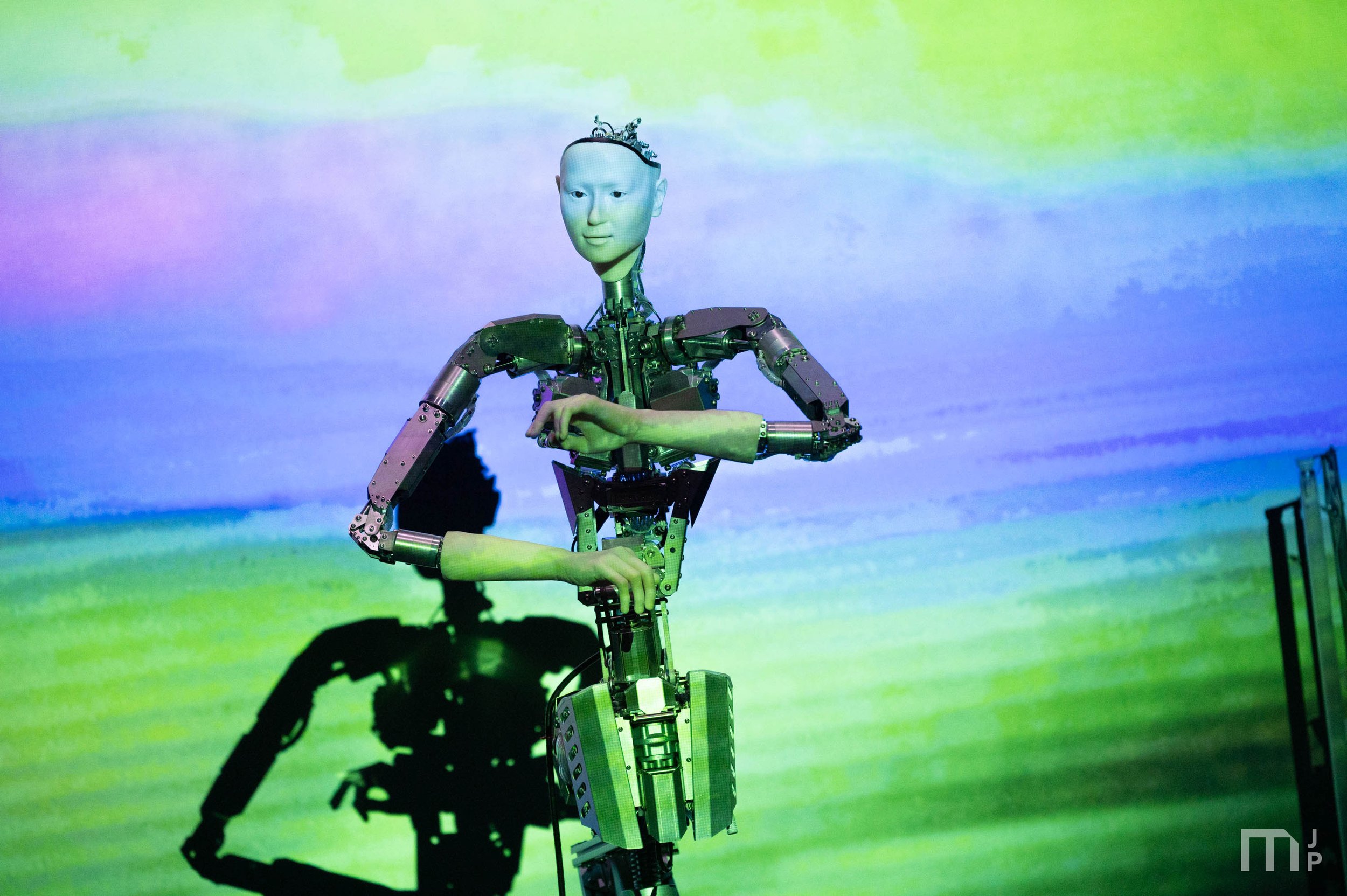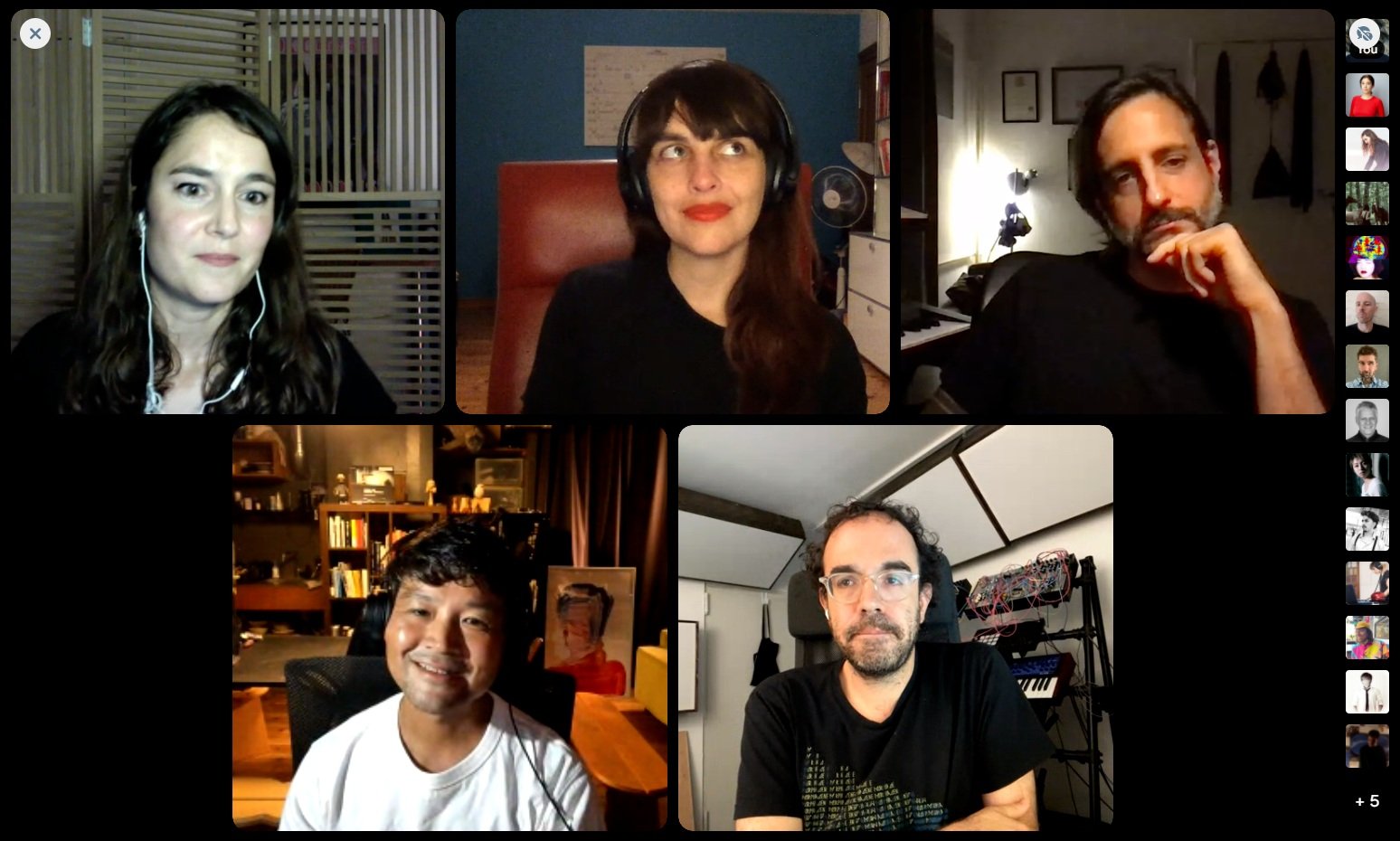
AI @ MUTEK Forum
Tiohtià:ke/Montréal | since 2020
2024 — Into the Wild: Towards AI Ecologies
In 2024 the AI track of the Forum was themed Into the Wild: Towards AI Ecologies. Featuring a series of interactive keynotes, critical panel discussions, film screenings and labs the theme explored the multifaceted relationships of AI including its environmental impacts, AI’s usage for addressing climate change, and a creative push for AI to inhabit wilder territories.
Connecting AI to thematics of sustainability and ecology, Massachusetts Institute of Technology (MIT) researcher, environmental scientist, architect, inventor, and electronic music producer Norhan Bayomi gave an opening keynote on Igniting Climate Action through AI and Art.
Co-presented with cultural institution Gray Area, a performative keynote from Berlin-based AI musician and researcher Portrait XO sonified a century of climate data anomalies. Interactive sessions on responsible AI and co-creativity featured Matthieu Lorrain, Global Head of Creative Innovation at Google, Kamya Ramchadican, Founder and Director of AI art festival for Climate Change Future Fantastic in Bangalore, and Yves Jacquier, Executive Director of La Forge, Ubisoft’s research and development group. Electronic musician and University of Toronto researcher Beth Coleman, explored the need to make AI "wild" again, resisting attempts to “tame” it, by drawing lessons from ecology and highlighting the early days of generative AI when glitches allowed for artistic exploration.
These critical discussions continued on Friday, when in collaboration with Concordia’s Milieux Institute and the Applied AI Institute, the Studio Hydro-Québec was transformed into the Wilding AI Lab, a day-long experiment with talks, performances and a makers fair. Abundant Intelligences, a research-creation program that imagines anew how to conceptualize and design Artificial Intelligence (AI) based on Indigenous Knowledge (IK) systems, presented a panel that brought together Dr Melanie Cheung (Neuroscientist, Aotearoa), Professor Karim Jerbi (Canada Research Chair in Computational Neuroscience and Cognitive Neuroimaging, and Director at UNIQUE. Assoc. Professor at Mila), and Artist and Professor Jackson Two Bears (Canada Research Chair in Indigenous Arts Research & Technology, Assoc. Professor Visual Art and Indigenous Studies at Western University).
Speakers 2024
Sofian Audry (CA/QC) — UQAM-Hexagram / Pía Baltazar (FR/QC) — Society for Arts and Technology / Adam Basanta (CA/QC) / Norhan Bayomi (EG/US) — Massachussets Institute of Technology / Dr. Melanie Cheung (NZ) — Cheung Consultancy Limited / Rowena Chodkowski (US/QC) — Concordia University / Beth Coleman (US/CA) — University of Toronto / Éric Desmarais (CA/QC) — Sporobole / Yves Jacquier (CA/QC) — Ubisoft / Luciano Frizzera (BR/QC) — Concordia University / Alice Jarry (CA/QC) — Concordia University / Karim Jerbi (CA/QC) — Université de Montréal / Kamyar Karimi (IR/QC) — Concordia University / Rose Landry (CA/QC) — Mila / François Lespinasse (FR/QC) — Concordia University / Marie-Eve Levasseur (CA/QC) / Jason Edward Lewis (CA/QC) — Abundant Intelligences - Concordia University / Matthieu Lorraine (CA/QC) — Google / Fenwick McKelvey (CA/QC) — Concordia University / Aurélie Petit (CA/QC) — Concordia University / Portrait XO (US/DE) — Sound Obsessed / Alexandre Saunier (FR/BE) — LUCA School of Arts / Bart Simon (CA/QC) — Concordia University / Jackson Two Bears (CA) — Western University
2023 — Destabilizing Diffusions
The arrival of general-purpose AI (GPAI) systems, such as ChatGPT or Stable Diffusion, radically accelerated the wide-spread use of these systems across the board. Their applicability to a wide-range of tasks presents a fundamental departure from previous, highly specialized systems. In addition, the streamlined and easy-to-use interfaces for the first time enabled a massive and conscious adoption of AI by the public. GPAI raises fundamental questions across the board ranging from well documented issues, such as bias, privacy, copyright, and transparency, towards unchartered territory, which was up until now the stuff of science fiction.
The evolving role of AI in and through artistic practice continued to be a central topic at the 9th edition of the Forum. Extending past conversations centered around questions of racial justice, surveillance, and the inherent risks associated with the collection of personal data, this year’s focus lied on the impactful arrival of general-purpose and generative AI tools such as ChatGPT and Stable Diffusion in our collective consciousness.
Co-curated with the Forum’s Creative Director Sarah MacKenzie, an entire day was dedicated to AI on Wednesday August 23rd. As a continuation of the recent (de)Stabilizing Diffusions exhibition at SAT, the AI-themed day expands interdisciplinary discussions bridging questions of confronting tech’s power, the role of art in the governance of AI, indigenous ways of knowing as acts of resistance, the environmental cost of AI and its gender- and race-based biases.
Speakers 2023
Behnaz Farahi IR/US | Edouard Lanctôt-Benoit CA/QC Blair Attard-Frost CA | Chris Salter QC/CH | Eliane Ellbogen CA/QC | Erin Gee CA/QC | Jerrold McGrath CA / Kasra Goodarznezhad CA / Luisa Ji CA / Maurice Jones DE/QC | Melissa Vincent CA | Michael Running Wolf US/QC | Raziye Buse Çetin FR | Sarah Myers West US | Tegan Maharaj CA / Tiara Roxanne US/DE / Valentine Goddard CA/QC | Yotam Mann US / Yung Spielburg US
2022 — The Genrefication of AI
The panel titled The Genrefication of AI – From Critical Encounters to Artistic Practice featured Montréal-based Mexican AI artist Isabella Salas; Hexagram artist/researcher and author of MIT Press’s Art in the Age of Machine Learning , Sofian Audry; Sónar+D and S+T+ARTS AI and Music Festival curator José Luis de Vicente; the curator of the first LATAM AI biennale, Julieta Agriano; and will be moderated by MUTEK AI Art Lab facilitator Peter Kirn.
Together, they explored the shifting role of AI in artistic practice, from serving as an object of critical investigation to the proliferation of AI art and music as artistic genres. Can artistic practice maintain its criticality towards AI despite its aesthetic and technological genrefication? What role does the proliferation of AI as an artistic genre play in upholding common narratives of technological advancement straight out of Big Tech's marketing playbook? How does the commercialization of digital artistic practices through cryptocurrencies and NFTs drive AI-generated art? What role does curation play in the genrefication of AI and its associated narratives? generated art?
Speakers 2022
Sofian Audry CA/QC / Isabella Salas MX/QC / José Luis de Vicente ES / Julieta Agriano AR / Peter Kirn US/DE
2021 — Exploring Imaginaries of Artificial Intelligence
Artificial intelligence was back as a recurring thread at the 7th edition of the Forum. The 2021 event brought together a group of international speakers to explore diverse imaginaries of AI, including a keynote by Benjamin Bratton, author of the influential MIT book The Stack, whose upcoming publication The Revenge of the Real studies the future of politics in a post-pandemic world and AI’s role within it.
This panel presented in collaboration with Ars Electronica’s FutureLab dove into the topic of cross-cultural approaches to collaborative composing between humans and machines, critically investigating the question of autonomy and human intention in the creative application of AI. Hosted by renowned AI music researcher Ali Nikrang, it featured Japanese sound artist Yuri Suzuki, Mexican-Canadian interdisciplinary artist and producer Isabella Salas, and digital culture researcher and writer Maya Indira Ganesh.
Furthermore, initiator of the Global AI Narratives project at Cambridge University Kanta Dihal was be joined by Artificial Life researcher Takashi Ikegami of Tokyo University, Montréal-based artist Lucas LaRochelle, and African Science Fiction expert and writer Nedine Moonsamy in a joint exploration of alternative imaginaries of AI.
Another set of short presentations offered insights into AI’s impact on the future of music, the digital arts, and XR, showcasing practical approaches towards algorithmic co-creation. Participating creators included former MUTEK AI Art Lab advisor Nao Tokui, Keychange cohort member and expert in copyright questions Celine Garcia, creative coder and experimental poet Sarah Ciston, and audiovisual artist Noah Pred.
As part of the series of artist Q&As taking place at the Forum, Turkish creator and computer scientist Memo Akten shared insights into his eclectic practice, which connects with artificial intelligence as much as it does with fundamental physics, and religion.
Finally, a workshop hosted by the creators of intelligent.museum, a practice-based research and development project at the ZKM | Center for Art and Media Karlsruhe and the German Museum, introduced participants to the basics of Deep Learning and allowed them to explore the topic of data bias.
Speakers 2021
Ali Nikrang AT — Ars Electronica Futurelab / Benjamin Bratton US — University of California San Diego / Celine Garcia FR — Puppet Master Label & Publishing / Isabella Salas MX/QC — Isabella Salas Studio / Jana Müller DE — Deutsches Museum Nuremberg / Kanta Dihal NL/UK — University of Cambridge / Lucas LaRochelle CA/QC — Queering The Map / Maya Indira Ganesh IN/DE+UK — University of Cambridge / Nao Tokui JP — Qosmo / Nedine Moonsamy ZA — University of Pretoria / Noah Pred CA/DE — Manifest Audio GbR / Orit Halpern US/QC — Concordia University / Ralf Eger DE — ZKM | Center for Art and Media Karlsruhe / Sarah Ciston US — University of Southern California / Takashi Ikegami JP — University of Tokyo / Yannick Hofmann DE — ZKM | Center for Art and Media Karlsruhe / Yuri Suzuki JP/UK — Pentagram Design
2020 — Interdisciplinary Perspectives on AI
Curated by Claudine Hubert, the MUTEK Forum 2020 investigated on Thursday, September 10 a new focus of the Festival’s professional component: artificial intelligence (AI) technologies. This theme is not only a continuation of the 2019 Forum, which explored AI’s contributions to artistic creation, but also of the MUTEK AI Art Lab—the first international multidisciplinary laboratory using artificial intelligence in the creation of audiovisual works, which was held in Montréal in March 2020 in partnership with Zú.
MUTEK Forum examined a broad spectrum of AI-related artistic practices through a perspective that centers questions of racial justice, surveillance, and the inherent risks associated with the collection of personal data. The Forum also featured workshops where artists and creators of every level have been able to familiarize themselves with the plethora of AI-specific techniques used in electronic music and sound creation.
Sabelo Mhlambi was in conversation with Maurice Jones to jointly explore Indigenous Relational Humanism (Ubu-Ntu) from Southern Africa, Afro-Futurism, and how we can re-imagine how we create and relate to AI and how it relates to us individually and as diverse communities.




